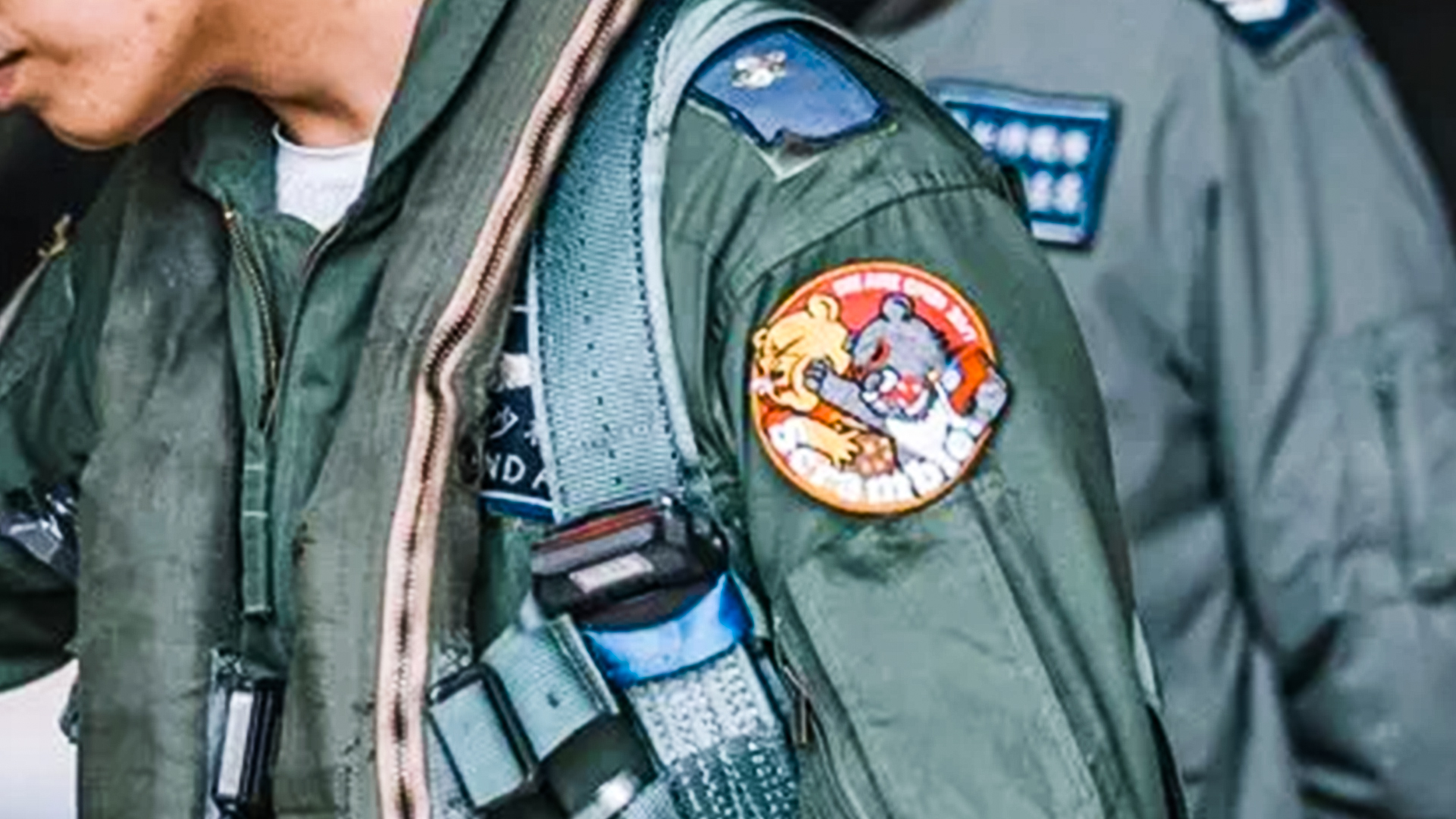Uniform patches. They’re popular with militaries around the world because they can be both eye-catching and a creative way to represent a unit’s history. Sometimes, they might even cause a bit of controversy, and not just because – as is the case with this latest uniform patch – it depicts what looks like the beloved children’s cartoon character Winnie the Pooh getting punched in the face by another bear.
Earlier this week, Taiwan’s Military News Agency released photos of a military training exercise, testing the island’s air defense capabilities. One of them shows a pilot conducting a pre-flight inspection of his aircraft. On his left shoulder is a patch embroidered with a Formosan black bear socking a golden Winnie the Pooh lookalike in the face. Around the edge of the patch reads the words “We are open 24/7” and “Scramble!”

This patch, though, is almost certainly not conveying the pilot’s dissatisfaction with a certain A.A. Milne cartoon.
Taiwan – officially the Republic of China – has existed since 1949 in opposition to the mainland government, the People’s Republic of China. Both countries continue to lay claim to being the true Chinese government, but Taiwan has existed for decades as a de-facto independent nation. While it is no longer represented in the United Nations, it maintains relations with many other countries, including the United States. This is all, of course, the biggest source of diplomatic tensions in the region, and preventing China from seizing Taiwan by force is a major part of the U.S. military’s theoretical mission in the Pacific.
Subscribe to Task & Purpose Today. Get the latest military news, entertainment, and gear in your inbox daily.
Amidst all the history is the fact that people seem to really like equating Chinese President Xi Jinping to Winnie the Pooh. It started back in 2013, when Xi met with then-President Barack Obama, and has continued for years. In response, the Chinese government has cracked down on any depiction of the cartoon bear, even going so far as to ban a 2023 slasher film Winnie the Pooh: Blood and Honey – which depicts the gentle pooh bear more like a real bear, relentlessly killing humans with no remorse.
The Formosan black bear – Taiwan was referred to as Formosa until the middle of the 20th century – is a popular symbol of Taiwanese identity. So the context of this pilot’s patch is pretty clear: Taiwan’s favorite bear is decking the stand-in bear for Xi Jinping.
The “We are open 24/7” and “Scramble!” words are probably a reference to the increasing frequency with which Taiwan’s air force pilots are responding to Chinese incursions that test the very edges of Taiwan’s airspace. The same day the picture of the patch was revealed, China was in the middle of a large-scale military exercise around Taiwan, with the Chinese military saying on Monday that it was “ready to fight.”
The Pooh-punching patch was reportedly made by a private company, Wings Fan Goods Shop, owned by Alex Hsu.
“I wanted to boost the morale of our troops through selling this patch,” Hsu told Reuters.
Since the picture first appeared on April 9, Hsu told Reuters he had sold out of the patch and was ordering more.
The Taipei Economic and Cultural Representative Office – essentially Taiwan’s embassy in Washington, D.C. – also promoted the patch, tweeting “Where can we get a patch like that! Guaranteed best sellers!”
This particular patch isn’t the first time certain militaries have targeted the People’s Republic of China through heraldry. Back in September 2020, U.S. airmen were sporting a patch with an MQ-9 Reaper drone superimposed over a red silhouette of China. In December of that year, the Air Force cracked down, writing in a memo that it would remove “any visual representation, symbols or language derogatory to any race, gender, sexual orientation, ethnicity, religion, age or disability status,” from its heraldry.
According to Reuters, Taiwan’s military was a bit more demure, telling the news agency that it did not “particularly encourage” service members to wear the patch, but that it would “maintain an open attitude” towards its usage.
The latest on Task & Purpose
- US providing Ukraine with 30mm gun trucks to blast Iranian drones out of the sky
- Marine trio honored for foiling stabbing at a Virginia Chick-fil-A
- Washington Post blasted over editorial that suggested cutting veterans’ disability benefits
- Ukraine is now fielding 1940s-era anti-aircraft guns as artillery
- Army Special Operations Command captured random civilian in training foul up
